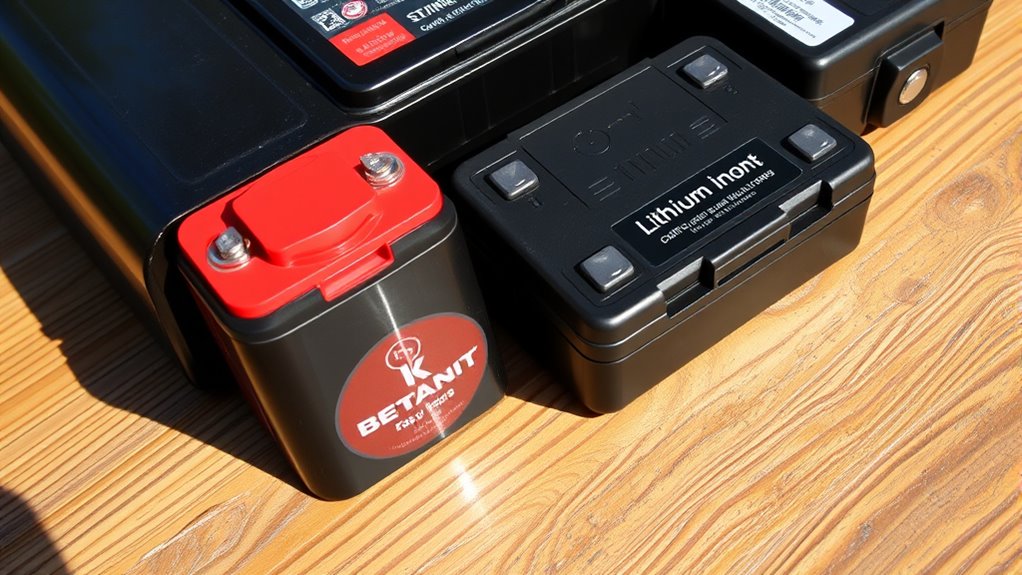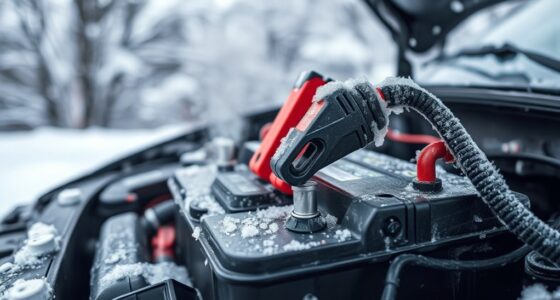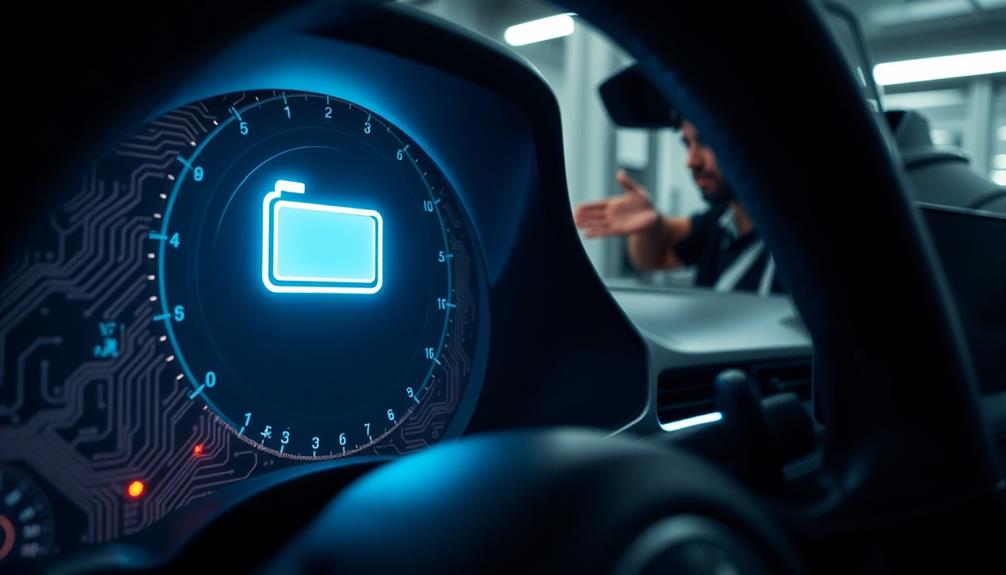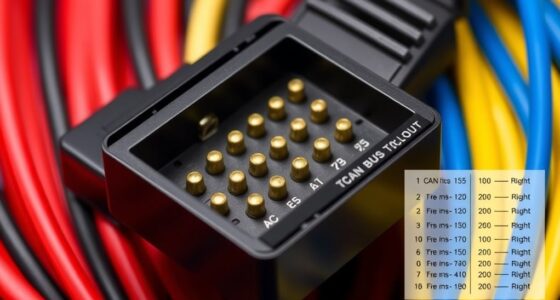A 12V battery type affects performance, lifespan, and where you should use it. Common options include lead-acid batteries, which are affordable and reliable but heavy, and lithium-ion batteries, known for their high energy density and lighter weight, ideal for portable devices and EVs. NiMH and NiCd batteries are also popular for their durability and ability to handle extreme temperatures. Understanding these differences helps you pick the right battery for your needs; keep exploring to learn more.
Key Takeaways
- Common 12V batteries include lead-acid, lithium-ion, NiMH, and NiCd, each with distinct chemistry and applications.
- Lead-acid batteries are reliable and cost-effective, often used in automotive and backup power systems.
- Lithium-ion batteries offer high energy density and are suitable for portable electronics and EVs.
- NiMH and NiCd batteries are durable, with NiMH being more common today for various applications.
- Battery chemistry affects performance, lifespan, safety, and compatibility across devices and systems.
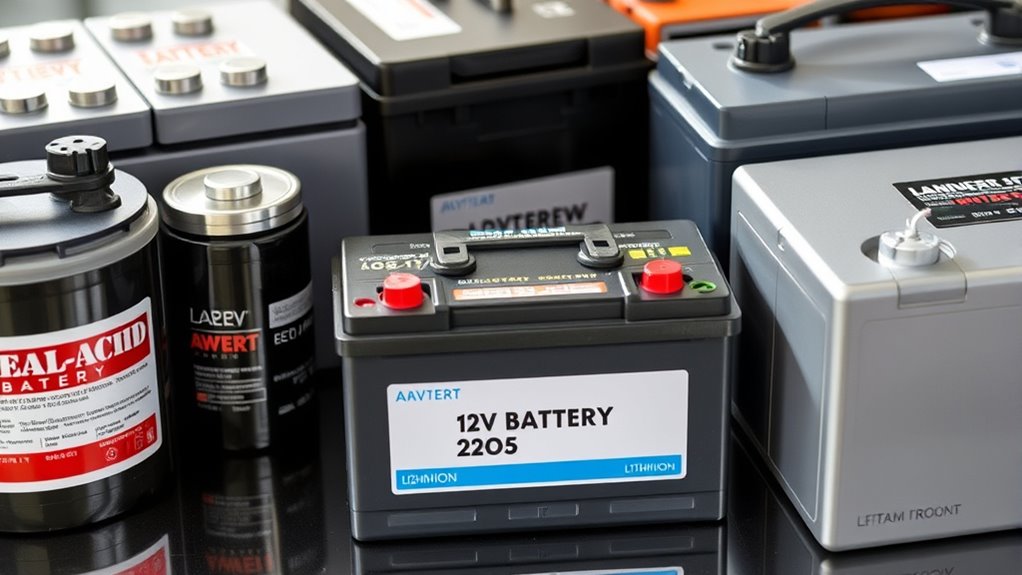
A 12V battery is a common power source found in many applications, from cars to backup systems. When you consider the variety of 12V batteries available, understanding the different V battery types becomes essential. These types are largely determined by battery chemistry, which directly influences their performance, lifespan, and safety. The main V battery types include lead-acid, lithium-ion, nickel-metal hydride (NiMH), and nickel-cadmium (NiCd). Each type has unique characteristics suited to specific needs, but they all adhere to certain voltage standards, with 12 volts being the common nominal voltage. This voltage standard ensures compatibility across a wide range of devices and systems, simplifying replacement and maintenance.
Lead-acid batteries are among the oldest and most widely used V battery types. They operate based on a chemical reaction between lead plates and sulfuric acid. These batteries are reliable, cost-effective, and capable of delivering high surge currents, making them ideal for automotive starter motors and backup power supplies. However, they tend to be heavier and have a shorter cycle life compared to other chemistries. Lithium-ion batteries, on the other hand, have revolutionized portable electronics and EVs due to their high energy density and lighter weight. Their battery chemistry involves lithium ions moving between anodes and cathodes, enabling efficient energy storage and release. Lithium-ion batteries maintain a stable voltage output throughout most of their discharge cycle, aligning well with modern voltage standards and providing longer cycle life.
Lead-acid batteries are reliable, cost-effective, and ideal for high surge applications, despite being heavier and shorter-lived than lithium-ion options.
Nickel-metal hydride (NiMH) batteries are another V battery type, known for a good balance of capacity and safety. They use a hydrogen-absorbing alloy for the negative electrode and nickel oxyhydroxide for the positive electrode. NiMH batteries are often used in rechargeable applications like power tools and hybrid vehicles. Nickel-cadmium (NiCd) batteries, while less common today, are noted for their durability and ability to perform well in extreme temperatures. They utilize a cadmium-based chemistry and have a nominal voltage close to 1.2V per cell, so multiple cells are combined to reach 12V. Additionally, advancements in battery management systems help optimize performance and safety for various chemistries.
Understanding these V battery types and their chemistry helps you choose the right battery for your application. The adherence to voltage standards like 12V ensures compatibility and safety, but knowing the specific chemistry and characteristics of each type allows you to optimize performance, lifespan, and cost. Whether you’re replacing a car battery, setting up a backup system, or designing a portable device, recognizing the distinctions among these V battery types makes your decision smarter and more effective.
Frequently Asked Questions
What Are the Advantages of Lithium V Batteries Over Traditional Types?
You’ll find lithium V batteries offer higher battery energy, meaning they store more power in a smaller size, which is great for compact devices. They also have longer charge cycles, so they last longer over time compared to traditional batteries. Plus, they charge faster and maintain their performance better under heavy use. Overall, lithium V batteries give you more reliable, efficient power, making them a smart choice for many applications.
How Do V Battery Types Impact Vehicle Performance and Longevity?
You might not realize it, but your choice of V battery type directly affects your vehicle’s performance and longevity. Higher battery capacity means longer runs without recharging, while more charge cycles extend the battery’s lifespan. If you opt for advanced V batteries, you’ll notice improved efficiency and durability, ensuring your vehicle runs smoothly for years. Don’t underestimate the power of the right battery choice—it’s the key to peak performance and lasting reliability.
Are V Batteries Environmentally Friendly Compared to Other Battery Types?
V batteries are generally more environmentally friendly than other types because they often have a smaller manufacturing footprint and better recycling options. You can easily recycle them, reducing waste and conserving resources. Plus, their design usually involves fewer hazardous materials, making them safer for the environment. By choosing V batteries, you’re supporting sustainable practices and helping lower your carbon footprint, making them a responsible choice for eco-conscious consumers.
What Safety Precautions Should Be Taken With Different V Battery Types?
Think of handling V batteries like tending a delicate garden—you need to be gentle and attentive. Always follow proper battery handling practices, avoid puncturing or crushing, and wear safety gear if needed. Store them in a cool, dry place away from metals and flammable materials. Proper storage safety and careful handling prevent leaks, short circuits, or fires, keeping you safe while preserving your batteries’ longevity.
How Can I Determine the Best V Battery Type for My Specific Application?
To determine the best V battery type for your application, start by evaluating your device’s battery capacity needs and voltage compatibility. Check the manufacturer’s specifications and consider how long you need the battery to last under typical use. Research different battery chemistries like lithium-ion or nickel-metal hydride, comparing their capacity and voltage ratings to find the one that best matches your device’s requirements for performance and safety.
Conclusion
Now that you know the different types of 12V batteries, you can select the best one for your needs. Did you know that lead-acid batteries still make up over 80% of the global automotive battery market? Understanding their strengths and limitations helps you make smarter decisions, whether for your car, backup power, or solar setup. With this knowledge, you’ll guarantee your system stays reliable and efficient for years to come.
